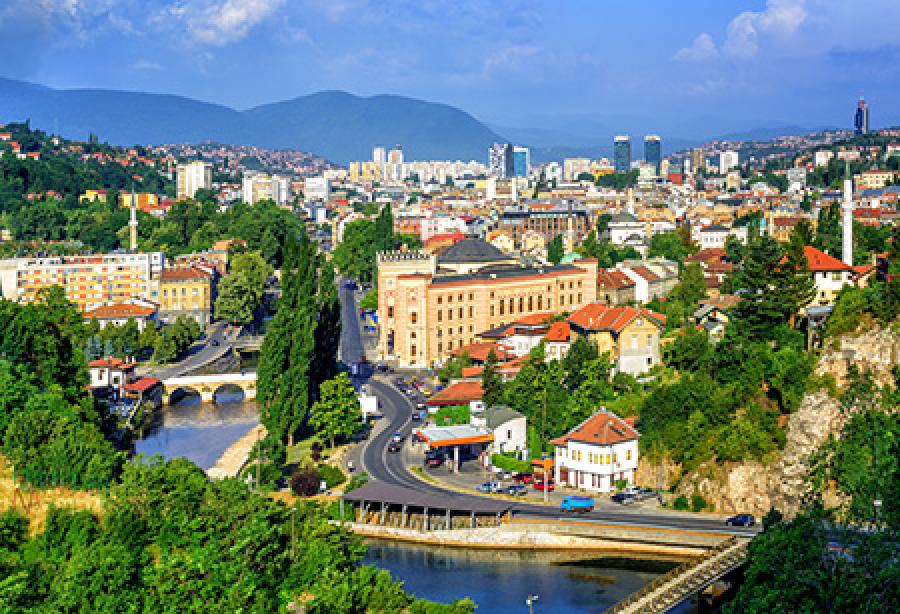Recent development in Bosnia and Herzegovina has plunged the country into a constitutional crisis which threatens not only its territorial integrity but also its European perspective.
As previously reported, a number of EU member states support sanctions against Republika Srpska, the Serb-dominated entity, and its divisive leader Milorad Dodik for his secessionist rhetoric and actions which risks undermining the fragile unity and territorial integrity of the country.
Among others, Dodik considers establishing a separate army or militia and opposes a law which would criminalise denial of genocide. The separatist stance of the Republika Srpska leader is only the tip of the iceberg of the crisis in Bosnia and Herzegovina, Western Balkans expert Thomas Bickl wrote in an op-ed in The Brussels Times
Republika Srpska is one of the two entities which were recognised in the Dayton Agreement in 1995 which ended the civil war in Bosnia and Herzegovina. The other entity is the Federation of Bosnia and Herzegovina which consists of 10 autonomous cantons with their own governments and legislatures. “The Federation entity government is still acting in a caretaker role,” according to the European Commission.
In its latest country report on Bosnia and Herzegovina, published in the enlargement package on 19 October, the Commission wrote that the public political commitment of the authorities at all levels of government to the strategic goal of European integration has not been turned into concrete action, as political leaders continued to engage in divisive rhetoric and unconstructive political disputes.
“The political environment remained polarised in the reporting period, with repeated calls from the Republika Srpska entity leadership to roll back reforms and to block State-level institutions.”
The Bosnian government called recently on the Israeli government to use its influence and rally the international community against the attempts to bloc criminalisation of genocide denial. The law would cover denial of the Holocaust and the Srebrenica genocide, where more than 8,300 Muslim men and boys were killed in 1995 in a massacre that international courts would later define as genocide, the first one on European soil since the Holocaust in WWII.
The Brussels Times asked Jacob Finci, the president of the Jewish community in Bosnia and Herzegovina, if he thinks the law against genocide denial will be adopted and accepted by Republika Srpska.
“Yes, because a similar law already exists in Serbia,” he replied, “but it is necessary to adopt this law in the Bosnian parliament and not to have the law imposed by the international High Representative to the country.”
He belongs to a family which arrived in Sarajevo after the expulsion of the Jews from Spain in 1492. The family is mentioned in the first Ottoman census in the 17th century. He was born in 1943 in the Italian detention camp on the island of Rab just off the northern Croatian coast, the first one of his family in the last 350 years to be born outside Sarajevo.
Jacob Finci is known as one of the two plaintiffs in the Sejdić and Finci case. The other one is Dervo Sejdić, who is of Roma origin. In a ruling in 2009, the European Court of Human of Human rights confirmed the discriminatory nature of the electoral system in Bosnia and Herzegovina, preventing those not belonging to its “constituent peoples” (Bosniaks, Croats or Serbs) from standing for election.
Until now, the necessary reforms have not been adopted and the country is still not a country of all its citizens. How do you feel that the ruling in 2009 hasn't been implemented yet?
“It’s strange that this important court decision from 22 December 2009 has not been implemented yet,” he replied. “All political parties, religious communities, and NGOs are confirming that they support the full protection of human rights, according to the European convention on Human Rights, still they don’t know how to implement the ruling.”
How can the current constitutional crisis in Bosnia and Herzegovina be resolved?
“The only solution is to seat together and find a solution which is acceptable for all ethnic groups in our country,” he replied. “But it might be necessary to agree that the changes to the constitution and the electoral law should be adopted after the election called for October 2022.”
“A first step will be to change the constitution and after that the electoral law. Since 2009, we have had elections in 2010, 2014 and 2018 with the existing law and the results of the elections were recognized. Now, we cannot change the rules just before some months before the election. To postpone this for the end of 2022 shouldn’t be a problem."
What is EU's role and what should it do to revive the accession process for Bosnia and Herzegovina?
“The accession process depends on us. We need to fulfil the EU conditions but the Office of the High Representative (OHR) and the EU Mission in the country should help us in our activities to meet the conditions. They are waiting for our solutions, and at the same time, we are waiting for suggestions and solutions from them.”
M. Apelblat
The Brussels Times

